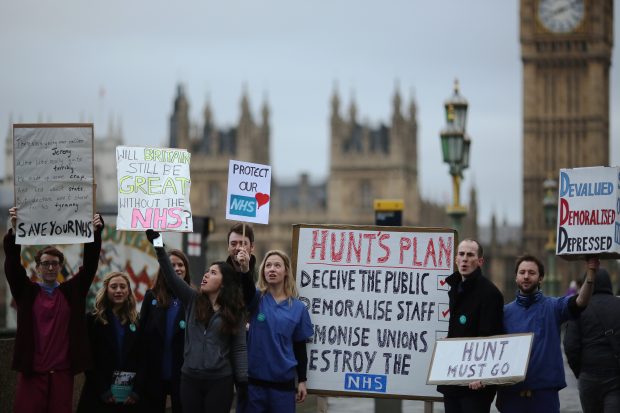Junior doctors are striking again: this time, for five days in a row over several weeks. This level of industrial action is without precedent in the history of the NHS. Even though I will soon be employed as a junior doctor under the terms of the contract, I think the decision to strike is scandalous.
In the early stages of this row, it was possible to sympathise with junior doctors’ discontent about having a contract imposed on them. Now it has become harder and harder to know what it will take to please them. The contract they were offered was a good deal — even the BMA said so. Yet for some junior doctors, it just wasn’t good enough. Before they continue in this dispute, these medics need to take a step back and realise that working in the NHS means a certain amount of putting up with what is handed down from above. That is the nature of a health system like ours.
Junior doctors, like other staff in the NHS, are public servants, employed by the state to serve the nation. It should be evident to them that, whether they like it or not, public servants sometimes get told what to do. That can be directly by the Government, or indirectly by the institution in which they work. Yes, these orders can be for better or worse, but it comes with the territory and is an inevitable part of state-funded healthcare.
So unless junior doctors are willing to scrap or seriously reform the NHS — ideas which are considered heretical in their circles — they must stop staging these organised tantrums. The public and the Government have a stake in the NHS and its finances, which give them both a right to influence its running. And this is the system which medics will have to learn to put up with, as all other public servants do. Junior doctors cannot have the proverbial cake of socialised medicine and eat it too.
What’s more, these new plans confirm the hypocrisy of the first round of strikes. These were carried out, it was emphasised, not for the sake of pay, but for patient safety. Yet even at the time this seemed specious. After all, abandoning patients seems a perverse way of improving patient safety. And these new, much longer five-day walkouts prove that concern for patient safety is only a pretext. Patients might have been able to tolerate a few small strikes, but these new plans are too obviously self-interested to pass muster.
Is there a chance these strikes aren’t about money? At best, it’s a small likelihood. But if it’s not about cash, these strikes then look as if they are being inflicted out of bitterness. It is as simple as that. Jeremy Hunt hurt their feelings by seeking to impose a contract on them, and now they are sulking. It won’t be easy for these embittered doctors to snap out of it. But if they don’t do it soon, patients, the NHS and the medical profession will be damaged by their behaviour. They must come to their senses as soon as possible.
Toni Saad is a medical student at Cardiff University






Comments